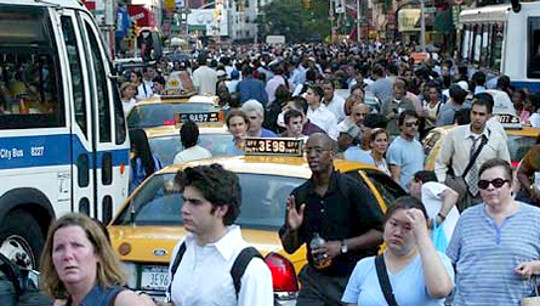
Think about the last time you left the house. Did strangers on the street acknowledge your presence with a smile or avert their glance? Chances are that the answer depended on your age, gender and, of course, your race.
There is no shortage of evidence that racism persists. Despite the fact that science has demonstrated that racial groups are defined by society rather than biology, an individual’s experience from the moment they are born is colored by the color of their skin.
Recently, high-profile incidents have focused attention on how people can be treated differently by authority figures, such as police officers, because of their race. However the majority of discrimination experiences are much more subtle.
In fact, subtle bias may actually be more mentally damaging than overt bias. This is because overt bias can be more easily dismissed as ignorant. However subtle bias is able to “get under the skin” to influence physical health.
Get The Latest By Email
Racism Affects Physical Health
In recent years, there has been a growing amount of research highlighting the effects of racial discrimination on not only mental health but also physical health. Discrimination may influence physical health through changes in stress physiology functioning.
As an example, in African-Americans experiencing racism has been associated with higher evening cortisol levels, which are considered unhealthy. Similarly, a study among Hispanic youth found that racism experience was associated with higher cortisol levels across the day.
Cortisol and other hormones in the stress physiology system are important for maintaining immune, reproductive and cardiovascular health. Therefore changes in this system as a result of discrimination experience can adversely affect everything from your body’s ability to fight infection to your ability to become pregnant.
The quantity of evidence supporting the relationship between discrimination and physical health is staggering. And yet discrimination may have even greater impacts than was initially recognized.
Racism Can Affect Health Across Generations
It is increasingly accepted that a woman’s mental and physical health in pregnancy influences her baby. Maternal health may influence offspring through exposure to hormones in pregnancy.
For example, women with high stress hormones give birth to infants with lower birth weight. Since being born small increases risk for developing poor health in adulthood, factors impacting maternal stress hormones in pregnancy could also affect long term offspring health.
While racial discrimination has well known impacts on adult health, less research has focused on the potential for racial discrimination to influence health in the next generation. However the studies that have been done suggest that there can be very important effects.
For example, racial discrimination has been associated with lower birth weight. One particularly interesting study, reported a decrease in birth weight among children of California women with Arab sounding names in the year following 9/11. The author attributed this finding to an increase in racial discrimination experience among these women.
I recently published an article that evaluated whether racial discrimination influences maternal and offspring stress physiology among a socioeconomically and ethnically diverse sample of women from Auckland, New Zealand. Auckland is an interesting cultural context to explore the effects of discrimination on health because it is very ethnically diverse; 39% of all residents were born overseas.
I tracked women who were in the late stages of their pregnancy. What I found was that women who experienced discrimination had higher evening stress hormone levels in late pregnancy, consistent with a pattern of chronic stress.
When I followed up their infants at six weeks of age, I found that their children had elevated stress response to vaccination. These findings suggest that experience of racial discrimination may actually have biological impacts lasting across generations.
What Do We Do About It?
Understanding the link between discrimination experience and poor health is an important first step towards raising awareness of this issue. But something obviously needs to be done in order to improve the health and well being of all members of society. Continuing to identify and call out the institutional and interpersonal experiences of discrimination is a necessary first step.
Interventions aimed at increasing social support and ethnic identity will likely increase resilience to discrimination experience. Efforts should not focus solely on these “buffering” interventions, however, as this effectively translates into placing responsibility on the victim rather than on the perpetrators of discrimination.
Tools, such as the implicit bias test, exist to help people identify their own biases that they may be unaware of. Recognizing the potential for subtle bias is necessary before anything can be done to address it.
![]()
This article was originally published on The Conversation
Read the original article.
About The Author
 Zaneta Thayer is an Assistant professor at University of Colorado Denver. She is a biological anthropologist interested in understanding how developmental exposures influence human biological variation. In order to explore these processes her current work addresses how contemporary human environments, which are largely shaped by social and political inequalities, influence a woman's biology and that of her developing fetus.
Zaneta Thayer is an Assistant professor at University of Colorado Denver. She is a biological anthropologist interested in understanding how developmental exposures influence human biological variation. In order to explore these processes her current work addresses how contemporary human environments, which are largely shaped by social and political inequalities, influence a woman's biology and that of her developing fetus.







